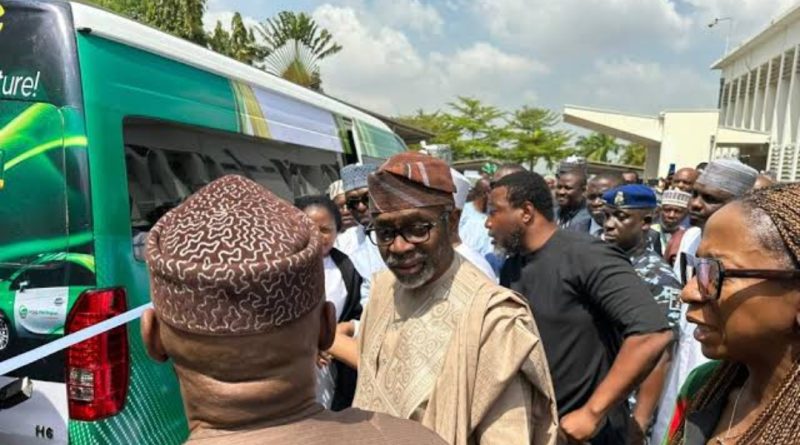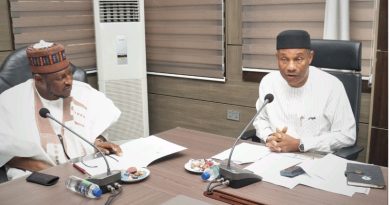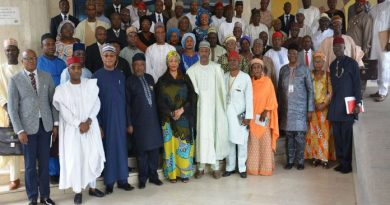FGN Flags Off CNG Bus Initiative, Creates 7 Conversion Centres Across Nigeria
State correspondent
Federal Government of Nigeria on Friday flagged off the Presidential Compressed Natural Gas Initiative (PCNGI), with seven conversion centres across Nigeria.
The flagged off the initiative was done by the Chief Of Staff to the President, Femi Gbajibiamila.
In a symbolic handover of the CNG buses to the State House, the Chairman of the Presidential CNG Initiative Steering Committee, Zacch Adedeji, who was represented by the Chief Executive Officer of the Midstream and Downstream Petroleum Regulatory Authority (NMDPRA), Farouk Ahmed, he announced that the government had waived the Value Added Tax (VAT) on the CNG buses purchase as well as seeking duty waivers for value-chain.
According to him, the goal was to build a sustainable future, leveraging Nigeria’s available cheap and clean energy source, which is gas.
Adedeji, who is also the Chairman of the Federal Inland Revenue Service, also disclosed that plans were underway for the government to establish multiple conversion centres across the Country in the next two weeks.
“Moreover, it is my pleasure as your Chief Tax Officer, a position I hold alongside as Chairman of this initiative, to announce that we will be waving the Value Added Tax on CNG purchases as well as seeking duty waivers for value-chain. The goal is to build a sustainable future, leveraging our own cheap and clean energy source gas.”
He stated that while the project is currently about the conversion of vehicles, it will also generate employment opportunities.
Adedeji emphasised that the delivery of the CNG project demonstrates President Bola Tinubu’s commitment to both environmental sustainability and economic growth in Nigeria.
Adedeji urged Nigerians to consider the buses as a symbol of a new beginning, “a journey towards the future, where the power of tomorrow starts today. Let this be a beacon for our country, Nigeria, and an inspiration to the world.
The Committee Chairman stressed that the buses running on compressed natural gas are not just a technical achievement, but a symbol of President Tinubu’s administration’s commitment to spearheading an energy revolution.
Project Director of the Presidential CNG Initiative, Micheal Oluwagbemi disclosed that State governments have already indicated investment interest in the CNG Buses, he mentioned that the Rivers State Government have already acquired a good number to ease the transportation challenges of the state.
Speaking on the Cost of Conversion, Oluwagbemi revealed that the current cost of conversion varies from the model and type of vehicle, adding that the President has ensured that as part of PCNGI, the committee will incentivise the cost for the Nigerian populace.
The Project coordinator assured Nigerians that they would be able to achieve conversion at a lower cost.
“Nigeria is a gas country with a very small quantity of crude oil, The President wants to make sure that the Nigerian public is not subjected to the price of transportation occasioned by international conflagration rather than being able to use the gas that Nigeria produces by Nigerian people such that jobs are also created at home instead of exported abroad.
“The current cost of conversion varies from the model and type of vehicle but the President has ensured that as part of PCNGI, we will look into that cost by helping and incentivizing Nigerians,” Oluwagbemi added.
He disclosed that in the immediate, the Federal government has ordered 55,000 conversion kits as part of the immediate palliative.
“Various stakeholders such as the labour unions, and mass transit bus operators. Either state or private will be able to benefit from those conversion kits.”
The Chairman of the Nigeria Governors’ Forum, AbdulRahman AbdulRazaq, noted that Nigeria is the eighth-largest gas-producing nation in the world and with 70%, of its hydrocarbon gas possession will strengthen the nation’s gradual transition from petrol-powered vehicles to gas–powered transit vehicles.
He charged the private sector to invest in the CNG Bus programme, emphasising that Universities in Nigeria will be the first beneficiaries of the buses and all state governments will also key into the program
He said: “This is the first major change to come. We all know that apart from having abundant gas resources, I think number eight in the world in gas reserves, gas is a cheaper means of transportation and cheaper means of energy.
“I remember former President Obasanjo established the Olokola Free Trade Zone because he wanted that zone to be powered by gas solely. So, as we transit forward, I encourage the private sector to invest in this gas programme. I commend the president as well because this programme, aside from kicking off at the Government House, our universities will be the first beneficiaries of the buses and all state governments will also key into this.
“Also, from my state, we’re going to invest massively and encourage our businessmen to invest massively in this transition. I can only praise Mr President that our dreams are being fulfilled step by step.” The Chairman NGF added.
Receiving the CNG Buses on behalf of the State House, the Permanent Secretary, State House, Olusesan Adebiyi said that the provision of the buses will enhance the efficiency of staff and enhance their punctuality at work.
He assured the PCNGI and partners that all operational buses of the State House will be converted to gas-powered vehicles.
“For the P-CNGi, I want to assure you to prepare for us because henceforth, all the staff buses we’ll have to buy from you and I can assure you we’ll soon set out to consult you and enter negotiations with you for not just purchase, but also maintenance.
“The State House has some fuel dumps and I want to assure you right away that one of our fuel dumps will be converted to CNG with immediate effect, to guarantee frequent fueling of these buses. I’ve discussed with you as well on the issue of maintenance. I want to also assure you that we will agree with you because one, this is new in Nigeria, and the spares are not readily available, so why not meet the manufacturers?
“The fact that these buses were assembled in Nigeria, it’s all Nigeria-made, is one thing that I will not forget in a hurry because as an engineer, I’ve been praying for this to happen and now it’s happening in my lifetime.




